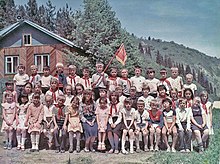pionnier
French
Etymology
From Old French peonier (“infantryman”), from peon (“footman”) - modern French: pion, from Latin pedo, pedonis.
Pronunciation
Noun
pionnier m (plural pionniers, feminine pionnière)
- (military) pioneer, soldier employed to form roads, dig trenches, and make bridges, as an army advances
- Toute la tranchée connaît à présent la nouvelle (...). Il paraît que les pionniers vont venir cette nuit, pour préparer les escaliers d'attaque. On doit installer des petits canons de 37 et des lance-bombes. (Dorgelès, Croix de bois, 1919)
- pioneer, one who goes before, as into the wilderness, preparing the way for others to follow
- Originalité d'un métier où l'on s'établit où l'on veut, comme on veut, dans la solitude, avec la liberté du pionnier américain. (Michelet, Journal, 1850)
- precursor
- Les pionniers de la civilisation.
- (communism) pioneer, child of 10–16 years in the former Soviet Union, in the second of the three stages in becoming a member of the Communist Party
- Ce même camp d'Artek, paradis pour enfants modèles (...) ce qui fait que je lui préfère de beaucoup d'autres camps de pionniers, plus modestes. (Gide, Retour de l'U.R.S.S.)
Synonyms
Adjective
pionnier (feminine pionnière, masculine plural pionniers, feminine plural pionnières)
- pioneering, avant-garde
- un esprit pionnier.
- The Shadows est un groupe pionnier du rock britannique.
- first to colonize
- La végétation pionnière est le premier type de végétation colonisant un milieu.
Descendants

The French word was borrowed in Russian, пионер (pioner), which in turn, through the influence of the Communist superpower, was widely adopted throughout Europe in the sense of young pioneer; the list below traces both direct (from French) and indirect (via Russian) borrowings.
Further reading
- “pionnier”, in Trésor de la langue française informatisé [Digitized Treasury of the French Language], 2012.
Middle French
Etymology
Noun
pionnier m (plural pionniers)
- infantryman
- 1581, Henri Lancelot-Voisin de La Popelinière, L'Histoire de France, enrichie des plus notables occurrences survenues ez provinces de l'Europe et pays voisins... depuis l'an 1550 jusques à ces temps, page 235
- Il s'estoit rompu une cheville du pied […] on luy envoia un pionnier pour le secourir.
- He broke an ankle […] they sent him an infantryman to secure him.
- Il s'estoit rompu une cheville du pied […] on luy envoia un pionnier pour le secourir.
- 1581, Henri Lancelot-Voisin de La Popelinière, L'Histoire de France, enrichie des plus notables occurrences survenues ez provinces de l'Europe et pays voisins... depuis l'an 1550 jusques à ces temps, page 235
Categories:
- French terms derived from Old French
- French terms derived from Latin
- French 2-syllable words
- French terms with IPA pronunciation
- French terms with audio pronunciation
- French lemmas
- French nouns
- French countable nouns
- French masculine nouns
- fr:Military
- fr:Communism
- French adjectives
- Middle French terms derived from Old French
- Middle French lemmas
- Middle French nouns
- Middle French masculine nouns
- Middle French countable nouns
